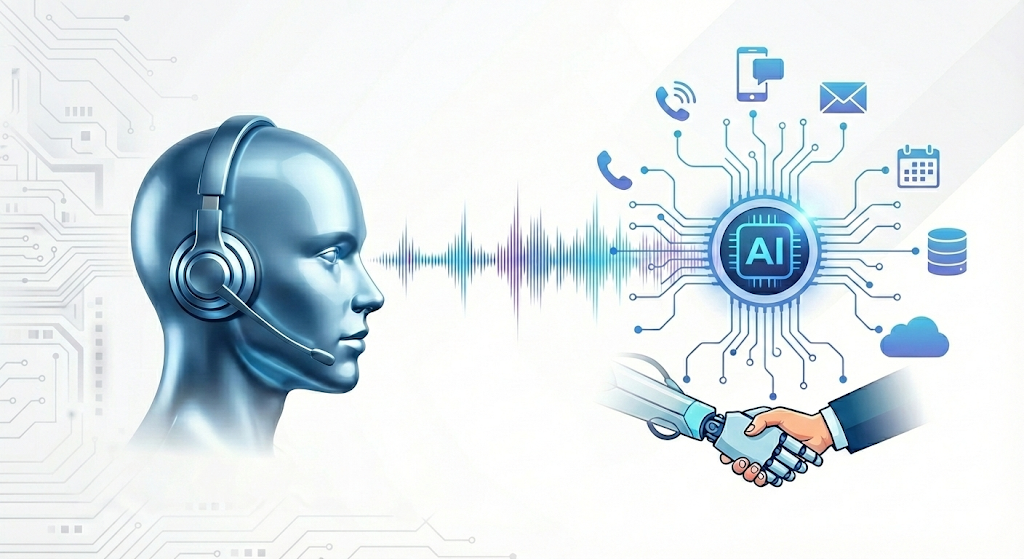Des objets vocaux, des personnes seules ?
Learn about the future of vocal objects, lonely people?.
At CALLR, we know how powerful voice interactions are. Hearing someone on the phone is reassuring, familiar. Voice connections are still more reliable, delivery-wise, than text messages. Calling someone on the phone is something virtually anyone is comfortable doing, old or young, “connected” or not. But let me play devil’s advocate for a moment. Is it possible that voice technology is leading society down a dangerous road? Let me explain. Voice technology and voice user interfaces (VUIs) are popping up everywhere. Amazon’s Alexa or Google Home are excellent examples. As screens get smaller, and the IoT more ubiquitous, consumers need a convenient way to interface with their connected world. Voice, as a hands-free mode of communication that pretty much everyone possesses, is a natural solution. Asking your connected thermometer to lower the temperature or ordering your car to turn off the radio is a lot more convenient than typing those commands – especially if you’re taking care of 3 hyperactive children or navigating a tricky intersection. In a few years, consumers might be talking to their refrigerators, homes, cars, computers, appliances – basically, inanimate objects – all day long .But my question is this: what kind of unintended emotional consequences might these new person-to-object interactions have?
The Power of the Human Voice
You know it intuitively – when you talk to or about someone – or something - you develop more of an emotional connection to it/him/her than if you merely typed the same thoughts. For brands, this is important. The 2017 Speak Easy report explained, Our neuroscience research gives early indication that speaking to a brand delivers a deeper emotional connection than interacting with it through type or touch. When people asked a question involving a brand name, their brain activity showed a significantly stronger emotional response compared to people typing that same brand question.”[footnote]

Image from Speak Easy, a report co-authored by J. Walter Thompson Innovation Group London and Mindshare Futures.[/caption]Indeed, we’re so attached to the human voice that we even tend to read text messages aloud in our heads. Psychologist John Suler explains in his book, Psychology of the Digital Age, “When reading another’s message, it is also possible that you “hear” that person’s words using your own voice. We tend to subvocalize as we read, thereby projecting the sound of our voice into the other person’s message. Unconsciously, it feels as if we are talking to/with ourselves.”[footnote]This power of the human voice is being taken seriously by designers of our connected environments: TechCrunch reported this April that, “Amazon’s Alexa is going to sound more human,” seeing as she is now able to whisper, pause for emphasis by taking a breath, adjust the rate, pitch and volume of her speech, and more. Clearly, for Amazon, bringing Alexa to life means creating a believable voice for her. And they’re right - voice is an aural fingerprint, a unique representation of someone’s personality. Why else would Mark Zuckerberg choose the commanding voice of Morgan Freeman for his own virtual assistant, Jarvis, or the seductive Scarlett Johansson be cast as Samantha in ‘Her’?[newsletter]
More emotional connection via VUI is better... right?
Speaking is emotionally evocative. For many, this is an excellent way to do something that’s very much needed – break our dependence on screens and inject some emotion into our relationship with tech. MIT’s David Rose, for example, argues convincingly in his book, Enchanted Objects, for creating connected devices rooted in humanity’s fundamental desires as expressed in fairytales and myth. Hence Rose’s invention of an ambient umbrella that glows blue when rain is near (Lord of the Rings fans will understand this reference), or an ‘energy orb’ that shifts colors to indicate the energy consumption rate of your home.

David Rose envisions a world populated with ‘enchanted objects,’ designed to respond to our fundamental human desires. Image source[/caption]Rose is fearful of a ‘sterile’ world dominated by screens, as he explains:
I have a recurring nightmare. It is years into the future. All the wonderful everyday objects we once treasured have disappeared, gobbled up by an unstoppable interface: a slim slab of black glass. Books, calculators, clocks, compasses, maps, musical instruments, pencils, and paintbrushes, all are gone [...] We interact with screens 90 percent of our waking hours. The result is a colder, more isolated, less humane world. Perhaps it is more efficient, but we are less happy."
Rose is skeptical of the screen as the primary interface for the connected future. And it’s not just him – anyone who’s watched the hit series Black Mirror, or even the cult classic Blade Runner, will know what he’s talking about. However, Rose does propose a solution: in his ideal world of ‘enchanted objects,’ technology infuses ordinary things with a bit of magic to create a more satisfying interaction and evoke an emotional response (check out the chart above). Rose would therefore probably feel quite optimistic about VUIs’ ability to make this vision a reality, both because voice user interfaces are an alternative to the “black slab,” as well as because voice is already an emotionally charged medium. Isn’t it better to ‘chat’ to a connected object, like you would a friend, than to be constantly typing with your eyes glued to a screen? Isn't it better that we can add voice communication to our connected objects that will soon come to dominate our public and private spaces?

Science fiction has long dialogued with our simultaneous attraction and fear of technology – and screens in particular. The recent hit series Black Mirror addresses many of society’s current digital anxieties. Image source [/caption]
“I want to have a feeling, I need to send a text.”
To answer this question, (and get to the heart of the matter), let me quote another MIT professor, Sherry Turkle, from a 2012 TED talk:
We're lonely, but we're afraid of intimacy. And so from social networks to sociable robots, we're designing technologies that will give us the illusion of companionship without the demands of friendship.
What does she mean by this? We’ve developed communication devices that give us the instant gratification of digitalized human connection – a text message, Facebook like, retweet – to the point that we’re becoming dependent on them. We need our phones and computers so we don’t feel lonely – ultimately, so we feel alive. “So before it was: I have a feeling, I want to make a call," she explains. “Now it's: I want to have a feeling, I need to send a text.”
So for example, many people share with me this wish, that some day a more advanced version of Siri, the digital assistant on Apple's iPhone, will be more like a best friend, someone who will listen when others won't. I believe this wish reflects a painful truth that I've learned in the past 15 years. That feeling that no one is listening to me is very important in our relationships with technology. That's why it's so appealing to have a Facebook page or a Twitter feed — so many automatic listeners. And the feeling that no one is listening to me make us want to spend time with machines that seem to care about us. Sherry Turkle, Connected, but alone? TED 2012
The fact that we let machines distract our precious attention away from our human companions is already a real problem. Recent work by Dr. James Roberts showed that nearly half of participants in a study on relationships and smartphones reported being ‘phone snubbed’ by their partner. Worse, people who reported higher levels of so-called 'phubbing' also reported higher levels of relationship conflict. You can probably see where I’m going with this. People are already letting their personal devices get in the way of their personal relationships. As we create even more human-like, emotionally charged objects that we talk to, confide in, and question all day long, won’t this make us even more emotionally dependant on technology, at the expense of our 'true' interpersonal relationships? Are we that far away from a world where, at the end of a long day, one might prefer discussing with their refrigerator what to have for dinner instead of running it by their spouse? Would a moody teen prefer confiding in a connected diary than in a parent? What about asking a connected 'magic mirror' how you look instead of a friend? Would you get an answer you like better? Just how easy will it be in a few years to surround ourselves with always listening, ever-amenable, ersatz 'friends' that can cater to our emotional needs without asking anything from us in return?[cta href="https://www.callr.com" txt="Give your brand a voice" btn="Check out our API"]
Human-centered Technology
I'm not suggesting that we turn away from our devices, just that we développer une relation plus consciente de soi avec eux, les uns avec les autres et avec nous-mêmes. Sherry Turkle, connectée, mais seule ? TED 2012
La réalité des relations interpersonnelles est compliquée et contre-intuitive. « Nous avons tendance à penser que le fait d'être toujours connectés nous permettra de nous sentir moins seuls. » Sherry a expliqué. « Mais nous sommes en danger, car c'est tout le contraire qui est vrai. Si nous ne pouvons pas être seuls, nous serons plus seuls. » Et pour apprendre à être seuls, nous devons établir des limites avec la technologie. Sherry a quelques conseils : « Commencez à considérer la solitude comme une bonne chose. Fais-lui de la place. Trouvez des moyens de démontrer cette valeur à vos enfants. Créez des espaces sacrés à la maison — la cuisine, la salle à manger — et récupérez-les pour la conversation. » Suggestes du Dr Robert quelque chose de similaire : délimitez des zones interdites à la téléphonie cellulaire dans votre maison, essayez d'avoir une chambre sans téléphone pendant une semaine, éloignez les téléphones de la table, pratiquez l'étiquette téléphonique. Alors que la technologie vocale devient de plus en plus sophistiquée et répandue, s'immisçant dans nos systèmes de transport, nos espaces publics et nos maisons, nous devons nous rappeler pourquoi c'est là. Norbert Streitz, chercheur en intelligence ambiante fait une distinction utile entre Une intelligence importune et orientée vers le système et Une approche axée sur les personnes, qui favorise l'intelligence. Le premier crée une technologie géniale qui finit par frustrer les gens, et le second met l'intelligence artificielle au service de l'expérience humaine. C'est à peu près l'idée : nous devons rester concentrés. Dans dix ou vingt ans, l'intelligence ambiante, les VUI et l'Internet des objets pourraient créer un monde connecté dans lequel nous pourrions finir par nous perdre. C'est aux concepteurs et aux consommateurs de ce monde connecté de se rappeler pourquoi nous sommes à l'origine de ces avancées technologiques, et gardez un œil sur la façon dont nos nouvelles technologies façonnent notre comportement collectif. En d'autres termes, la technologie doit être au service de l'expérience humaine, et non l'inverse. À l'ère de la cyberintimidation, des « fausses nouvelles », etc., cela est primordial. Je suis d'accord avec Sherry : »Je ne suggère pas que nous nous détournions de nos appareils., juste que nous développions un relation plus consciente de soi avec eux, les uns avec les autres et avec nous-mêmes. »
Autres articles
Nous maitrisons notre propre réseau
Couverture mondiale
Commandez des numéros en un seul clic dans plus de 220 pays, y compris des numéros premium, personnalisés ou gratuits.
Chiffré et sécurisé
Chiffrement des données à la pointe des dernières technologies avec notamment HTTPS, SIP TLS et SRTP
Un réseau fiable
Grâce à nos nombreux centres de données et serveurs situés dans le monde entier, nous offrons un service robuste sur lequel vous pouvez compter.
Opérateur enregistré
Nous exploitons notre propre réseau pour plus de performance, une meilleure localisation et un support à votre service.







